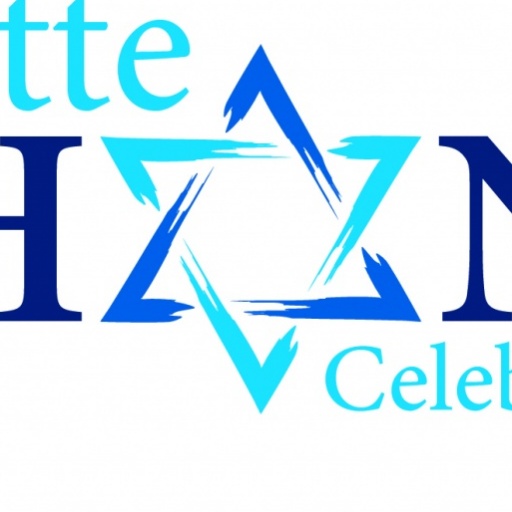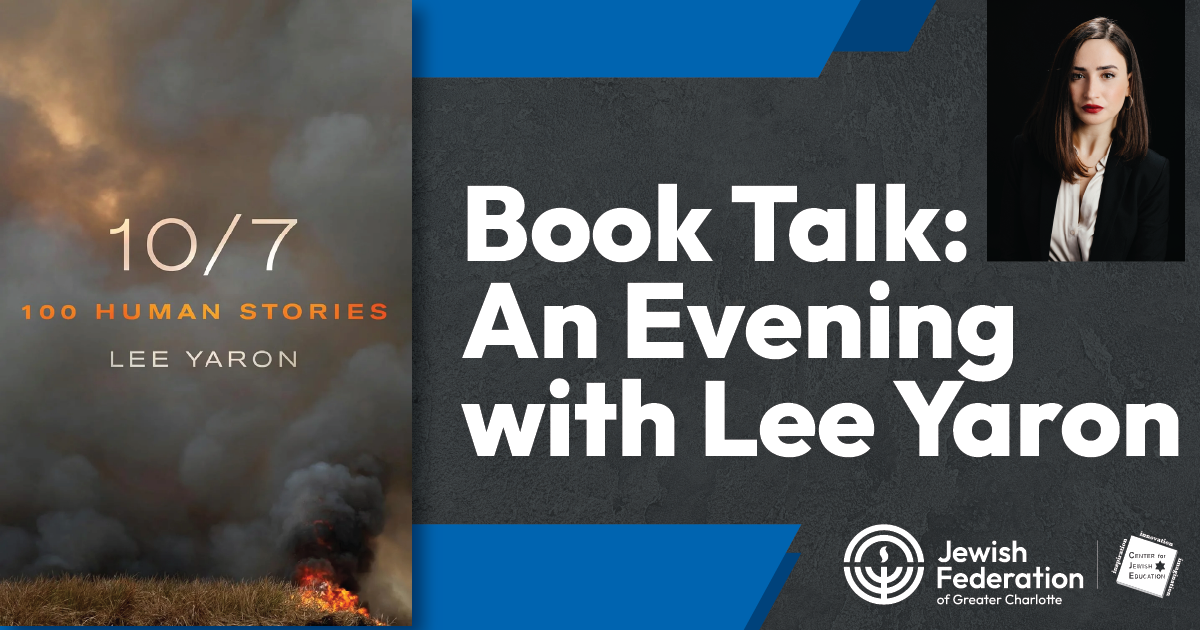By Noah Goldman
10/7: 100 Human Stories – Book Review
October 7 stands as a day of profound tragedy and trauma for the Jewish people, a focal point of many meanings that will forever hold a place in Jewish and Israeli history—a day this generation will never forget. For many, it marks a turning point in modern history, but for those who survived it, October 7 will not only be a chapter of history, but a day marked on their own lives.
On December 5, Jewish Federation of Greater Charlotte’s Center for Jewish Education will be hosting Lee Yaron, a journalist with Haaretz known for her work amplifying voices in the margins of Israel. Yaron captures this tragedy and its untold stories in her new book, “10/7: 100 Human Stories.”
These are stories of ordinary people who worked hard to build lives for themselves and their loved ones, only to be thrust into a day worse than any nightmare. Rather than politicians or generals, Lee Yaron’s focus is entirely on civilians, sharing the raw and deeply personal accounts of those who lived through October 7 and those who died on that day. She takes great care to represent voices across the spectrum—religious and secular, right and left wingers, Israeli and non-Israeli, including Arab, Ukrainian, Thai, and Nepalese individuals.
Her careful attention to each story ensures that readers connect with these individuals not only as victims, but as human beings with complex lives and personal passions. She introduces each human being with care, allowing readers to understand their lives, interests, and what brought them to southern Israel that day. These underappreciated and often untold histories enrich the book’s telling of human resilience and suffering.
Yaron integrates historical context into each story, covering topics such as the expulsion of Jews from Arab countries, the challenges faced by Bedouins in Israel, and the plight of Ukrainian Jews, who fled Putin’s rockets two years ago only to later flee Sinwar’s rockets in southern Israel. Her account gives significant attention to the massacres at the kibbutzim and the Nova music festival in the fields of Re’im, where 364 people were murdered.
The stories she recounts are profoundly moving, each deserving of our respect and empathy. This is not a book to be read quickly; its emotional depth demands time and respect. The book is filled with heart-wrenching stories, and it feels almost unjust to single out a few. Nevertheless, here are three stories that Yaron shares:
The book highlights the story of Sujood Abu Karinat, a young, devout, hijab-wearing Muslim woman who was on her way to the hospital that morning to give birth to her first child. As she was in labor, her car was stopped by Hamas terrorists who shot her twice in the stomach. Sujood survived only because her unborn baby took the two bullets.
There’s the story of Chaim Rumi, a 55-year-old religious Jew in the small town of Ofakim in Southern Israel who had found his life’s purpose in being the director of the municipal cemetery. He awoke on Simchat Torah expecting to pray and celebrate the Giving of the Torah. Instead, he spent that Simchat Torah organizing 25 funerals, many for people he had known for years. For 50 sleepless hours, Chaim worked to ensure all 25 were buried in accordance with Jewish tradition and each family’s customs.
Yaron shares the story of Himanchal and Prabin, Nepalese agricultural workers on Kibbutz Alumim. They had joined the kibbutz as part of a group of 17 seeking higher wages, education, and work experience. That morning, the kibbutz was breached by Hamas. Both men were gravely injured in the attack, and many of their friends, despite pleading for mercy and emphasizing their Nepalese and Buddhist identities, were brutally killed.
“10/7: 100 Human Stories” cuts to the core of Israeli identity, raising challenging questions about the State of Israel’s foundational purpose: to protect the Jewish people from existential threats. On October 7, the State of Israel failed in that mission, and until the remaining 101 hostages are returned, Israel’s recovery from this failure remains incomplete.
For anyone seeking to understand the trauma currently lingering within Israeli and Jewish societies today, this book is essential. Yaron’s writing is both brilliant and accessible, offering a deeply human perspective on an incomprehensible tragedy. It is our responsibility to share these stories and ensure their legacy endures. The headlines may fade, but as long as the hostages remain, this story is far from over.
Lee Yaron will be here at Shalom Park for a moderated conversation about her new book on Thursday, December 5, at 7:00 PM. This event is more than an evening of reflection; it’s an opportunity to connect, understand, and bear witness. We invite the entire community to join us and to bring friends and family who want to better understand what this moment in history means to us and the ongoing trauma many of us live with. Together, we can share in an evening of truth-telling, remembrance, and respect.
This event is free and open to the community, but registration is required. Books are currently available for preorder for a reduced rate of $20, and will also be for sale at the event.


